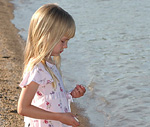
A primary characteristic of healthy young children is their ability to experience joy. Although all children are sad sometimes, preschoolers tend to be inherently joyful. But Joan L. Luby, M.D., associate professor of child psychiatry and director of the Early Emotional Development Program at Washington University School of Medicine in St. Louis, has found that, like adults, very young children can experience depression.
“We studied 174 preschool children and found that some were, indeed, clinically depressed,” Luby says. “We also have learned that their symptoms tend to be age-appropriate versions of the symptoms seen in depressed adults.”
But knowing that some children get depressed is different than finding children at risk. Diagnosing depression in a 3-year-old is a lot different than making the diagnosis in an adult, or even an older child. One technique Luby has used is a “puppet interview.” Children are asked about their feelings by observing two puppets talking with one another. The puppets discuss how they feel, and the child chooses which puppet best expresses his or her own emotion.
Since it is not practical to use such detailed diagnostic techniques with every child, Luby’s team also has developed a 16-question questionnaire, called the Preschool Feelings Checklist, for use in clinics, pediatricians’ offices and other community settings.
“It’s a very simple, yes-no checklist that takes about two minutes to complete,” Luby says. “Parents answer questions about their children, and it turns out that it’s very useful for identifying the children at highest risk for depression.”
The Preschool Feelings Checklist includes statements like “has a lot of trouble following simple directions or rules,” “whines or cries a lot,” “uninterested in play,” etc. A parent’s answers to those questions closely correspond to their child’s risk.

In testing the checklist, Luby’s team looked at parents’ answers and then went on to conduct detailed examinations of the children. The researchers found that a score of three or higher on the checklist meant a child was at risk for depression. She says because the checklist is such a sensitive and specific tool, it may be possible to use it to identify children who might need a more comprehensive depression screening.
Luby and colleagues are studying more preschoolers to get an idea of how common depression is in very young children and how reliable the checklist might be in finding children at risk.
She says many pediatricians and developmental psychologists used to believe that when children had emotional problems, they would report what psychiatrists call “masked symptoms.” These include complaints of headache, stomachache or other physical symptoms not related to the underlying problem. But Luby says her work suggests that anhedonia, the inability to experience pleasure, is the best marker for depression in preschoolers.
Luby and her colleagues plan to conduct detailed studies of more than 300 children and to follow them for two years to learn whether they are depressed, what kind of depression they have and whether the depression that affects young children might continue to recur for many years, just as it does in many adults.
Luby JL, Heffelfinger A, Koenig-McNaught AL, Brown K, Spitznagel E. The Preschool Feelings Checklist: A Brief and Sensitive Screening Measure for Depression in Young Children. Journal of the American Academy of Child and Adolescent Psychiatry, vol. 43:6, pp. 708-717, June, 2004.
This research was supported by grants from the National Institute of Mental Health of the National Institutes of Health.
Washington University School of Medicine’s full-time and volunteer faculty physicians also are the medical staff of Barnes-Jewish and St. Louis Children’s hospitals. The School of Medicine is one of the leading medical research, teaching and patient care institutions in the nation, currently ranked second in the nation by U.S. News & World Report. Through its affiliations with Barnes-Jewish and St. Louis Children’s hospitals, the School of Medicine is linked to BJC HealthCare.